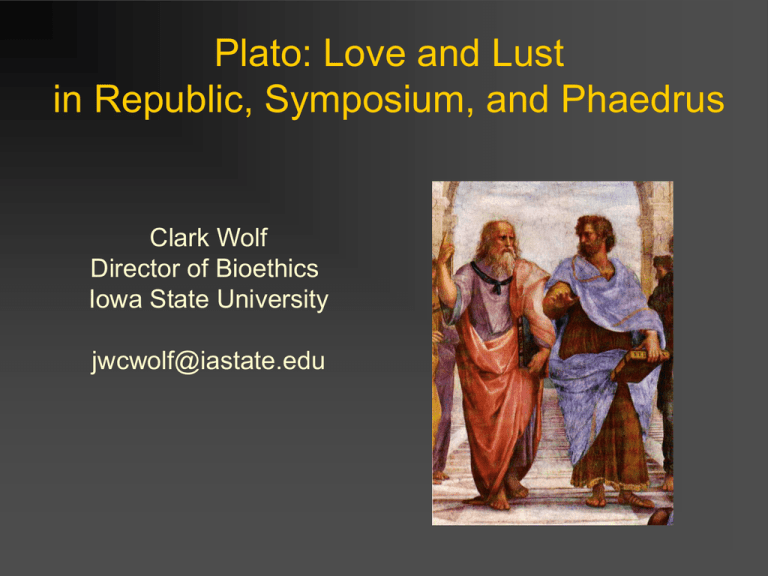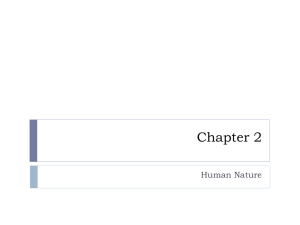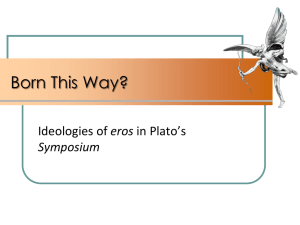
Plato: Love and Lust
in Republic, Symposium, and Phaedrus
Clark Wolf
Director of Bioethics
Iowa State University
jwcwolf@iastate.edu
Argument for Analysis:
The human function must be associated with what
is highest and best in human beings, and with the
characteristics that distinguish human beings from
non-human animals and other things. But it is our
capacity for intelligent reasoning that distinguishes
human beings– it is our highest, best, and most
important faculty, which distinguishes us from
everything else. So whatever the human function
is, it must essentially involve the exercise of our
reasoning capacity.
The human function must be associated with what is highest and best in
human beings, and with the characteristics that distinguish human
beings from non-human animals and other things. But it is our capacity
for intelligent reasoning that distinguishes human beings– it is our
highest, best, and most important faculty, which distinguishes us from
everything else. So whatever the human function is, it must essentially
involve the exercise of our reasoning capacity.
1) The human function must be associated with what is highest and best
in human beings.
2) The capacities that are highest and best in human beings are the ones
that distinguish us from non-human animals and other things.
3) It is the human capacity for reason that distinguishes human beings
from non-human animals and other things.
4) Therefore (preliminary conclusion) the capacity for reason is what is
highest and best in us.
Conclusion: Therefore the human function essentially involves the
exercise of reason.
Argument for Analysis
Love stinks! When people are in love, they experience
horrible pain and longings that make them miserable and
cause them to do stupid things. Being in love is a bad thing,
because people who are in love are ruled by their desires
and passions, not by reason. But being loved– being the
object of someone’s love– is also a bummer! People who
are in love are possessive and clingy. It’s disgusting! And
they’re jealous too: they become nervous when the person
they love spends time with friends, because lovers want to
occupy the life of the person with whom they are obsessed.
It’s much better to keep away from all that stupidity and
insanity.
Love stinks! When people are in love, they experience horrible pain and
longings that make them miserable and cause them to do stupid things.
Being in love is a bad thing, because people who are in love are ruled by
their desires and passions, not by reason. But being loved– being the
object of someone’s love– is also a bummer! People who are in love are
possessive and clingy. It’s disgusting! And they’re jealous too: they
become nervous when the person they love spends time with friends,
because lovers want to occupy the life of the person with whom they are
obsessed. It’s much better to keep away from all that stupidity and
insanity.
People who are in love become stupid and unreasonable, and miserable.
2)
It’s worse for us when we’re stupid and unreasonable, and miserable.
Conclusion: Being in love is a bad thing for the person in love.
1)
When people are in love with someone, they become clingy and
possessive and try to control the person they love.
2)
It’s bad for a person if someone else is clingy and possessive, trying to
control her (or his) life.
Conclusion: Being loved by another person is bad for the person who is loved.
1)
Plato on Love:
One function of Philosophy: Philosophy should enable us, by
the use of reason, to organize our lives well. It should free us
of unnecessary fears (like the fear of death), and from being
captured or ‘overcome’ by irrational emotions and attitudes.
Plato on Love:
Love is a hugely powerful force in human lives, one that has
the potential to go astray and make people absolutely
miserable. Philosophy, as a study designed to help us to
organize our lives, has a role to play here, to help us to
understand this force, to plan for its effects, and to insure that
it plays the right role, rather than the wrong one, in our lives.
On the feeling of crazy passionate love:
Dan (Jude Law): I fell in love with her, Alice.
Alice (Natalie Portman): Oh, as if you had no
choice? There's a moment, there's always a
moment, I can do this, I can give in to this, or I
can resist it, and I don't know when your
moment was, but I bet there was one.
-Closer
Seneca on the Stages of Passion:
Seneca’s example is ‘anger.’
Seneca was a Roman Stoic Philosopher
1)
2)
3)
First Movement: autonomic, reflexive,
non-deliberative. (Skin prickles,
adrenaline flows, face flushes…)
Moment of Decision: Person must assent
or consent to move into a passion. This
is an act of will
Full blown passion: Reason is no longer
in control, passion possesses us.
On the feeling of crazy passionate love:
“Well, love is insanity. The ancient Greeks
knew that. It is the taking over of a rational
and lucid mind by delusion and selfdestruction. You lose yourself, you have
no power over yourself, you can't even
think straight.” - Marilyn French
On the feeling of crazy passionate love:
“You're in a car with a beautiful boy, and he won't tell you
that he loves you, but he loves you. And you feel like
you've done something terrible, like robbed a liquor store,
or swallowed pills, or shoveled yourself a grave in the dirt,
and you're tired. You're in a car with a beautiful boy, and
you're trying not to tell him that you love him, and you're
trying to choke down the feeling, and you're trembling, but
he reaches over and he touches you, like a prayer for
which no words exist, and you feel your heart taking root
in your body, like you've discovered something you didn't
even have a name for. (…) …he touches you with his
fingers and burns holes in your skin with his mouth and it
hurts when you look at him and it hurts when you don't, it
feels like someone's cut you open with a jagged piece of
glass.” –R. Siken
On the feeling of crazy passionate love:
Some texts seem to question whether it’s really
love at all.
Remember that the best relationship is one in which your love for
each other exceeds your need for each other.
-Dalai Lama XIV
I Corinthians 13:4-8 (NIV): Love is patient, love is kind. It does not
envy, it does not boast, it is not proud. It does not dishonor others, it
is not self-seeking, it is not easily angered, it keeps no record of
wrongs. Love does not delight in evil but rejoices in the truth. It
always protects, always trusts, always hopes, always perseveres.
Love never fails.
People did write about crazy passionate love in
the Ancient world: Is this evidence that it is a
human universal?
SAPPHO, (630-612 BCE) Fragment 31:
“He seems to me equal to gods, that man
whoever he is who opposite you sits close
and listens to your sweet speaking and
lovely laughing. Oh, it puts the heart in my
chest on wings. For when I look at you,
even a moment, no speaking is left in me.
No! My tongue breaks and thin fire races
under my skin, in my eyes there is no
sight, drumming fills my ears, cold sweat
holds me, and shaking grips me all. I am
paler than dried grass, and seem in my
madness to be little better than dead! But
I am compelled to dare everything…”
Also from Sappho:
“Eros shakes my soul, a wind on the
mountain overwhelming the oaks.”
"If you're squeamish, don't prod the beach
rubble."
Plato: Love is a Serious Mental Disease
REPUBLIC: Republic 329b-d, Character of Cephalus:
“I was once present when someone asked the poet Sophocles:
“How are you as far as sex goes, Sophocles? Can you still
make love with a woman?” “Quiet man,” the poet replied, “I am
very glad to have escaped from all that, like a slave who has
escaped from a savage and tyrannical master.” I thought at the
time that he was right, and I still do, for old age brings peace
and freedom from such things. When the appetites relax and
cease to importune us, everything Sophocles said comes to
pass, and we escape from many mad masters.”
Plato: Love is a Serious Mental Disease
Two Philosophical Perspectives from
Phaedrus:
View from the rim of heaven”
(Phaedrus 247b)
View from the Chariot: (Phaedrus246b)
Plato: Love is a Serious Mental Disease
Symposium (189d-193d), Speech of
Aristophanes: A myth about the origin of
sex—once human beings were completely
round, with back and sides in a circle and
with four legs and arms. We were separated
by Zeus who, as a punishment, divided each
into two separate individuals. Sundered from
our “other half,” we run about trying to
reconnect and so to become whole again.
Plato: Love is a Serious Mental Disease
Symposium (190e-191a) Zeus “cut those human beings
in two, the way people cut sorb-apples before they dry
them or the way they cut eggs with a hair. As he cut
each one, he commanded Apollo to turn its face and half
its neck toward the wound, so that each person could
see that he’d been cut and keep better order. [Then
Apollo] …drew skin from all sides over what is now
called the stomach, and there he made one mouth, as in
a pouch, with a drawstring and fastened it at the center
of the stomach. [Then he shaped people] using some
such tool as shoemakers have for smoothing wrinkles
out of leather on the form. But he left a few wrinkles
around the stomach and navel…”
Symposium: Love as the search
for our “other half.”
Symposium (191a-c), Aristophanes:
“Now since their natural form had been cut
in two, each one longed for its own other
half, and so they would throw their arms
about each other, weaving themselves
together, wanting to grow together. In that
condition they would die from hunger and
general idleness, because they would not
do anything apart from each other.”
Symposium: Love as the search
for our “other half.”
“…each one longed for its
own other half, and so
they would throw their
arms about each other,
weaving themselves
together, wanting to grow
together. In that condition
they would die from
hunger and general
idleness, because they
would not do anything
apart from each other.”
Nussbaum on the silliness of this story & the absurdity of sex:
“From the point of view of desire,… the penetration of a part of
one’s own body into some opening in the loved one’s body is
an event of excitement and beauty. From the outside it just
looks peculiar, or even grotesque; (…) As we hear
Aristophanes’ distant myth of this passionate groping and
grasping, we are invited to think how odd, after all, it is that
bodies should have these holes and projections in them, odd
that the insertion of a projection into an opening should be
though, by ambitious and intelligent beings, a matter of the
deepest concern. (…) From the outside, we cannot help
laughing. They want to be gods—and here they are running
around anxiously trying to thrust a piece of themselves inside a
hole; or perhaps more comical still, waiting in the hope that
some hole of theirs will have something thrust into it.”
Martha Nussbaum, 1986.The Fragility of Goodness, 172-3
Symposium (211c-d) “Ladder of Love” (Scala Amoris):
Speech of Socrates, explaining what he learned from a
teacher of his, Diotima. He says she told him:
“This is what is is to go aright, or to be led by another,
into the mystery of love: one goes always upwards for
the sake of this Beauty, starting out from beautiful
things and using them like rising stairs: from one body
to two and from two to all beautiful bodies, then from
beautiful bodies to beautiful customs, and from
customs to learning beautiful things, and from these
lessons he arrives in the end at this lesson, which is
learning of this very beauty so that in the end he
comes to know just what it is to be beautiful.”
Gregory Vlastos’s Characterization of Plato’s View:
“We are to love the person so far, and only insofar, as they are
good and beautiful. Now since all too few human beings are
masterworks of excellence, and not even the best of those we
have the chance to love are free of streaks of the ugly, the
mean, the commonplace, the ridiculous, if our love for them is
to be only for their virtue and beauty, the individual, in the
uniqueness and integrity of her individuality, will never be the
object of our love. This seems to me the cardinal flaw in Plato’s
theory. It does not provide for the love of whole persons, but
only for love of that abstract version of persons which consists
of the complex of their best qualities. (…) The high climactic
moment of fulfillment—the peak achievement for which all
lesser loves are to be ‘used as steps’—is the one farthest
removed from affection for concrete human beings.”
--Vlastos, G. 1973. Platonic Studies. NY: Princeton U. Press:
Does Plato Advocate “Platonic”Love?
Question: Is Vlastos right? Is Plato’s view of
love ‘impersonal?’ A possible counterexample,
but from an untrustworthy character
(Alchibiades):
Symposium (215a-222c) The Speech of
Alcibiades: Speaks of his particular love for a
particular person (Socrates), expressed in
terms of Socrates’s unique characteristics.
Very unlike the image of love presented in
Socrates’s own speech!
Martha Nussbaum on what we might make of Alcibiades
claim that this is the way to tell the truth about love:
“What could lie behind this claim? Perhaps something
like this: There are some truths about love that can be
learned only through the experience of a particular
passion of one’s own. If one is asked to teach those
truths, one’s only recourse is to recreate that
experience for the hearer: to tell a story, to appeal to
his or her imagination and feelings by the use of a
vivid narrative. Images are valuable in this attempt to
make the audience share the experience, to feel, from
the inside, what it is like to be that.”
--Nussbaum 1986, p. 185)
Phaedrus:
(1) Lysias’s Speech: Sex without
passionate attachment as the
ideal:(231a-234d) argues that it is better to
have a love life with someone who is not in
love with you, because the strong
emotions associated with love cause pain
and unpleasantness between lovers, while
“lovers” who merely use one another for
pleasure won’t suffer those disturbances.
Phaedrus
2) Socrates’s First Speech: An Argument Against Love
(237a-241d): Socrates argues that passionate love is bad for
the person in love, because it makes those who are in love
stupid and disgusting, and it is bad for the person who is
beloved because lovers love the beloved the way wolves love
lambs. (241a) A love will fear losing the beloved, and so will
want to keep her or him weak and dependant. So just as lambs
have reason to avoid the wolf, those who are loved by others
need to protect themselves and should probably flee. Socrates
implies, peculiarly, that indeed it is much safer to have a sexual
relationship when love is absent.
(Epicurus agreed!)
On the feeling of crazy passionate love:
Is the advice to avoid upsetting passions
like love, because they’re disturbing?
“Who wants that? I'd rather choose to fall
in love and be hurt. Sometimes I can't
even sleep because I love someone so
much. And there's always sadness in our
lives. It's that sad feeling that keeps us
going. Because if we can overcome that
sadness, we can hope for happiness in
the future.” –House
Phaedrus
(3) Socrates Second Speech: Love as divine
madness (244a-257c) “’There is no truth to that
story,’—that when a lover is available you
should give your favors to one who doesn’t love
you instead, because he is in control of himself
while the lover has lost his head. That would
have been a fine thing to say if madness were
bad, pure and simple; but in fact the best
things we have come from madness, when it is
given as a gift of the God.
Phaedrus: Love as Divine Madness
Two Varieties of Madness: “There are two kinds of
madness, one produced by human illness, the other
by a divinely inspired release from normally accepted
behavior.”
Four Kinds of Valuable (Divine?) Madness:
(i) Madness of prophesy (244c)
(ii) Madness to escape guilt and hardship (244e)
(iii) Madness of Poetry (245a) and
(iv) Madness that overtakes us when we perceive
beauty with the eye of love (249d)
Phaedrus: Love as Divine Madness
“When he sees… a form that has captured beauty, first he
shudders and a fear comes over him like those he felt at the
earlier time. Then he gazes at him with the reverence due to a
god, and if he weren’t afraid people would think him completely
mad, he’d even sacrifice to this beloved person as if he were
the image of a God. Once he has looked at him, his chill gives
way to sweating and a high fever, because the stream of
beauty that pours into him through his eyes warms him up and
waters the growth of his wings. Meanwhile the heat warms him
and melts the places where the wings once grew, places that
were long ago closed off with hard scabs to keep the sprouts
from coming back; but as nourishment flows in, the feather
shafts swell and rush to grow from their roots beneath every
part of the soul (long ago, you see, the entire soul had wings).”
Phaedrus: Love as Divine Madness
Phaedrus 251c-d: “Now the whole soul seeths and
throbs in this condition. Like a child whose teeth are
just starting to grow in, and its gums are all aching and
itching—that is exactly how the soul feels when it
begins to grow wings. It swells up and aches and
tingles as it grows them. But when it looks upon the
beauty of the beloved and takes in the stream of
particles flowing into it from his beauty (that is why this
is called ‘desire’), when it is watered and warmed by
this, then all its pain subsides and is replaced by joy.”
Phaedrus (251d-e): “When, however, it is separated from the
beloved and runs dry, then the openings of the passages in
which the feathers grow are dried shut and keep the wings from
sprouting. Then the stump of each feather is blocked in its
desire and it throbs like a pulsing artery while the feather pricks
at its passageway, with the result that the whole soul is stung
all around, and the pain simply drives it wild. But then, when it
remembers the beloved in his beauty, it recovers its joy. From
the outlandish mix of these two feelings-- pain and joy—comes
anguish and helpless raving: in its madness the lover’s soul
cannot sleep at night or stay put by day; it rushes, yearning,
wherever it expects to see the person who has that beauty.
When it does see him, it opens the sluice-gates of desire and
sets free the parts that were blocked up before. And now that
the pain and the goading have stopped, it can catch its breath
and once more suck in, for the moment, this sweetest of all
pleasures.”
The phomenology of love at Pheadrus 251a-c:
We see…
We react with a shudder of awe
(remembrance!)
We are drawn to regard the beloved person
almost like a God.
Chill, sweating, fever, a “melting of the soul”
Throbbing, aching passion
Compare Sappho Fragment 31: Follows
almost the same sequence!
People did write about crazy passionate love in
the Ancient world: Is this evidence that it is a
human universal?
SAPPHO, (630-612 BCE) Fragment 31:
“He seems to me equal to gods, that man
whoever he is who opposite you sits close
and listens to your sweet speaking and
lovely laughing. Oh, it puts the heart in my
chest on wings. For when I look at you,
even a moment, no speaking is left in me.
No! My tongue breaks and thin fire races
under my skin, in my eyes there is no
sight, drumming fills my ears, cold sweat
holds me, and shaking grips me all. I am
paler than dried grass, and seem in my
madness to be little better than dead! But
I am compelled to dare everything…”
Plato’s Defense of Love in Phaedrus:
1) Plato’s description does not defend love as
a reasonable activity– it is something that
transports us.
2) The value of this transport is still (in part)
that it raises our minds to things that are
higher and most real. But this is part of a
process that involves the other person
essentially, not merely as an accidental
means.
Plato’s Defense of Love in Phaedrus:
3) Plato’s account of love incorporates
something like a “modern” view that people
in love will commit their lives to one another.
4) Interestingly, Plato claims that wise lovers
will abstain from sex (?!) because the
attraction of pleasure might change the
quality of their experience of each other.
Abstinence (apparently?) keeps the
passions alive more effectively. (?!)
Two Conceptions of Love in Plato?
(i) In Symposium, this reaction to beauty (not
described in such appreciative terms!) was presented
as the first step in a process that would lead us,
ultimately, to abandon the individual for the sake of a
more abstract and intellectual devotion to beauty itself.
(ii) In Phaedrus, this is described as a “divine
madness” that constitutes the first stage in a lifelong
relationship of devotion, after which the devoted lovers
“sprout wings together” and ascend to bliss.
Two Perspectives?
Do we live “from the rim of heaven,” or do
we experience life as if “from the seat of
the chariot?”
Two perspectives, not two theories?
Upshot?
1) Perhaps Plato’s view of love changed over time, and it is
not appropriate to associate with him the standard “Platonic”
view that is so frequently criticized.
2) His later view does include a role for love as a particular
attachment to another person as an individual, not simply as a
stand-in for a more abstract and higher philosophical value.
(Perhaps this claim should be qualified?)
3) Plato’s dialogues, and especially Symposium and
Pheadrus, present a broad collection of different views. It is
inappropriate to associate the words of Socrates (or of “The
Athenian Stranger” of the later dialogues) with Plato himself.
4) I don’t have a fully satisfactory account of Plato’s view. (?)









